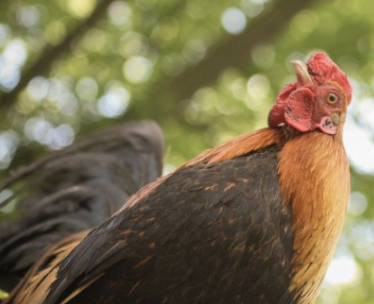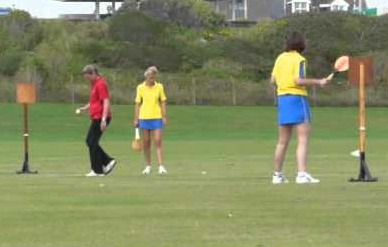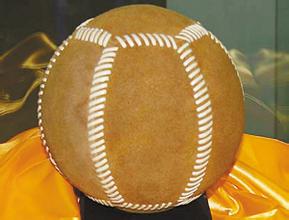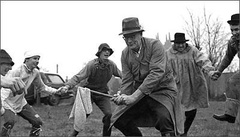(单词翻译:单击)
5.Cock Shying
5.扔公鸡
Cock-shying, also known as "cock throwing," was a blood sport practiced throughout most of England up until the 18th century. If you're looking at the name and thinking this was a cruel game wherein people threw a rooster as far as they could relax, it's not that.
"扔公鸡"的另一种英文写法为cock throwing,是一项凶残的运动,英国大部分地区直到18世纪都十分流行。你看到这个名字也许会自动脑补人们残忍地把公鸡像铅球一样扔得老远的画面。放心,事实没那么简单。

Actually, people threw things at the rooster until they killed it. Specifically, they threw weighted sticks called "coksteles." Lacking a cokstele, regular cudgels would do. This tradition was associated for centuries with Shrove Tuesday (aka Pancake Day, the last day before Lent). However, cock-shying was frequently practiced at pubs just for the fun of it—and for the chance of winning a rooster. The bird would be taken outside and tied to a post with a few feet of freedom so it could evade incoming sticks. Players would throw their coksteles at the rooster, and spectators would bet on the outcome. If a player hit the rooster without killing it, he was allowed to try to grab the dazed bird before it recovered. If he succeeded, he could take it home. As with eel pulling, there was an attempt to ban cock-shying that also went poorly. In 1660, on the day before Shrove Tuesday, the practice was banned in Bristol. The next day, a riot broke out. The rioters threw dogs and cats at the mayor's house in protest.
这项运动实际上是向公鸡扔东西直到它被砸死。人们朝公鸡扔一种叫"公鸡棒"的特制加重棍子。如果没有"公鸡棒",其它棍棒也可以拿来使用。该传统与几个世纪以来的忏悔日,又叫"薄饼日",即大斋节的前一天有关。然而"扔公鸡"常常成为酒吧的乐子——这也是赢得公鸡的好机会。大家会走到室外把公鸡拴在柱子上,拴公鸡的绳子有几尺长,让公鸡能够躲避迎面扔来的棍子。参赛者负责向公鸡扔棒子,观众则可下注。如果参赛者把公鸡砸晕,只要他能在公鸡醒来之前将其抓住,就能把公鸡带回家。与"拉鳗鱼"一样,政府曾试图禁止扔公鸡运动,但成效甚微。1660年,布里斯托尔政府在忏悔日前一天明令禁止该运动项目,第二天就发生了暴乱行为。暴乱者向市长家里扔猫猫狗狗以示抗议。
4.Stoolball
4.老式板球

Unlike most other entries on this list, stoolball is a sport that is still occasionally played in small areas of southeast England. Its origins trace back to the 14th century in Sussex. Some historians see it as an ancestor of both cricket and baseball while others point out that stoolball was the first bat-and-ball game played in North America in Plymouth, 1621.
不同于本文中的其他运动,老式板球至今仍会偶尔出现在英国东南部的一些小地区。该运动起源于14世纪的苏赛克斯,部分历史学家将其当作板球和棒球的"祖先",另一部分则认为,老式板球是1962年在北美的普利茅斯兴起的第一项击球运动。
The modern game of stoolball is only a best-guess version of the ancient game. There is no definitive historical evidence of how it was played in the past. Also, being a folk game that was open to both men and women, it is likely that the rules were changed from region to region. Players hit a ball using a bat and then run between stools to score. The bat is a wooden paddle with a short handle and an oval shape, and the stools play the role of wickets in cricket. There was a time when stoolball was popular enough to make its way into Shakespeare's The Two Noble Kinsmen. In 1927, there were over 1,000 stoolball clubs around the world. In his account of his experiences as a prisoner of war during World War II, Pat Reid described a game called stoolball being played by the prisoners at Colditz. However, the name was purely coincidental and had nothing to do with the historical sport.
现代版的老式板球规则只是对古时候该运动的猜测,至于过去到底怎么玩,我们并没有得到确凿的历史证据。作为一项民间运动,参赛者的性别不受限制,而且各个地区也可能会有不同的规则。运动员用球拍击球,然后在凳子之间奔跑以得分。球拍的形状为椭圆形的木板外加一个短手柄,凳子则充当球门。曾经有一段时间该运动很受欢迎,连莎士比亚都将其纳入了自己的作品《两位贵族亲戚》。1927年,全球的老式板球俱乐部数量超过了一千。帕特·瑞德回忆起他二战期间作为囚犯的经历时说,科尔迪茨城堡战俘营的囚犯们都玩一种叫"老式板球"的游戏。然而,这个名字只是一种巧合,与本文讨论的该运动无关。
3.Episkyros
3.古希腊蹴鞠

Episkyros was a simple ball game played by the ancient Greeks. However, it was not intended for serious athletes. The Greeks considered athletic pursuits among the most worthwhile and held all sportsmen in high regard. Episkyros was a game meant for everybody else. Old people, women, and children were all free to enjoy this game.
古希腊蹴鞠是古希腊时期的一项简易球类运动。然而该运动并不是专为职业运动员设计的。古希腊人视体育为终身事业并对所有运动员持有至高无上的敬意。古希腊蹴鞠却是为公民设计的运动,老人、妇女和孩子们都能乐在其中。
Two teams of equal members stood opposite each other, and a line—the skuros—was drawn between. Two more lines were drawn behind each team. One team then threw the ball over the other and tried to advance as their opponents recovered. The second team grabbed the ball and threw it back, trying to make up any lost ground and push the other players back. The winners were the first team to completely push the other side over the line that was originally behind them. Basically, a few agile players would attempt to catch the ball while the rest of the team worked together to push the opponents back, so it was similar to modern rugby or American football. Episkyros was particularly popular in Sparta, where it was expected for children and women to take part in athletic displays. It later inspired a more physical Roman game called harpastum.
球员数量相同的两支队伍相对而站,球场中间有一根分界线,两队背后的球场边界分别也有一根分界线。为避免球落入对方手中,队员一般以高空传球的方式进攻,对手此时会尽力抢球并往回扔,努力赢回失去的阵地并逼退进攻的队伍。把对手完全赶出其身后分界线的一方获胜。其实很少会有机敏的队员在自己队伍齐心协力把对手往外推的同时还试图接球,所以这项运动有点像现代橄榄球和美式足球。古希腊蹴鞠在斯巴达非常受欢迎,那里的孩子和妇女都很喜欢运动。罗马兴起的一项更为激烈的运动"哈帕斯托姆"便由此而来。
2.Fox Tossing
2.抛狐狸

Back during the 17th and 18th centuries, when Europe's aristocracy wasn't busy hunting foxes, they were flinging them into the air in a game known simply as "fox tossing." It was typically reserved for the upper classes and was usually performed at big events because fox tossing required a lot of preparation, a large enclosed area, and dozens if not hundreds of animals.
说到"抛狐狸",就少不了十七、十八世纪的欧洲贵族。那时他们还没有沉浸在打狐狸上,而是更乐意把狐狸抛向空中,后来还演变成为一项体育运动。举办抛狐狸大赛要准备的东西相当费力,如广阔的封闭场地和大量的动物,所以这项比赛只流行于上层社会。
The game was played in pairs. Each member of a team would hold the end of a sling lying on the ground. Foxes would be let loose in the enclosure. When one ran over the sling, both players pulled hard in order to throw the fox into the air. The winner was the team that achieved the greatest height. The reported record for this practice was 7.5 meters. Don't let the name fool you. Foxes were not the only unwilling participants in this game. Other critters were happily used when foxes were not available. In fact, at a famous fox tossing event held in Dresden, almost 700 foxes were used along with over 500 hares, 34 badgers, 34 wild boars, 21 wild cats, and three wolves. The sport was often dangerous for all involved because the scared animals would attack the players.
比赛通常两人一组,放一条绷带在地上,每人抓住一头。准备好后就把狐狸放入比赛场地到,只要狐狸经过某条绷带上方,该组队员就会全力拉紧绷带将狐狸抛向空中。谁抛的狐狸最高谁就赢得比赛。该项赛事最高记录为7.5米。不要被该运动的名字所迷惑,狐狸可不是唯一倒霉的动物。狐狸不够用时,其他的动物也要遭殃。德累斯顿曾举办过一场著名的"抛狐狸"大赛,一共享了700只狐狸,500只野兔,34只野猪,34只獾,21只野猫还有3只狼。该赛事还具备一定的危险性,受到惊吓的动物通常会攻击参赛选手,就连兔子急了也会咬人呢。
1.Dwile Flonking
1.甩啤酒布

Like stoolball, dwile flonking is still practiced in remote areas of the English countryside. The origins of dwile flonking are a bit murky. Flonking enthusiasts proudly claim this practice dates back to medieval times, originating during the Suffolk harvests 400 years ago, but that seems very unlikely. Others claim it is a far more recent invention of the 1960s and a matter of town pride.
和古代板球一样,甩啤酒布比赛至今仍可在边远的英国小乡村里出现。该比赛的起源还颇有争议。热衷于该比赛的人说它源于四百年前中世纪萨福克的昌盛时期,但这说法有点不靠谱。另外有人说它始于近期的二十世纪六十年代,而且它的发明还是自己村的骄傲。
Its future is looking just as murky. This traditional pub sport has been banned in several areas for violating health and safety regulations. As you would expect with any pub game, dwile flonking involves drinking, a lot of drinking. It also involves two teams trying to fling a beer-soaked cloth, or "dwile," at each other's heads. After a sugar beet is tossed to see who goes first, one player holds a pole with the dwile on it, or "driveller," while the other team dances in a circle around him, which they call "girting." He must hit one of the players with the dwile. If he misses, the player is called a "swodger." While the opposing team forms a straight line, he must then down a pot of beer before the dwile gets passed from player to player down the line. There's also a point system, but most participants are too drunk by the end of the game to care who won.
甩啤酒布比赛的前途也是扑朔迷离,因为这项传统的酒吧竞技因为违反健康安全管理条例而被很多地区禁止。酒吧竞技怎么能少得了酒呢,甩啤酒布比赛的用酒量更是不在话下。该比赛通常分为两队,队员互相往对方的头上甩被啤酒浸湿的衣物或是抹布。先抛一根甜菜,看尖部指向哪方,则该方率先出战。一名队员拿着啤酒布的一端,对手围着他转圈跳舞。该队员必须要把啤酒布甩到任意一个对手的脑袋上。如果失败了,则会被人叫做swodger,同时对手们会站成一条直线并将啤酒布由头传到尾,在此过程中败者必须喝完一大罐啤酒。虽然该比赛也有一套计分规则,但大家到了最后往往都喝高了,谁还要关心比赛的输赢。
翻译:彼得潘、小飞侠 来源:前十网


